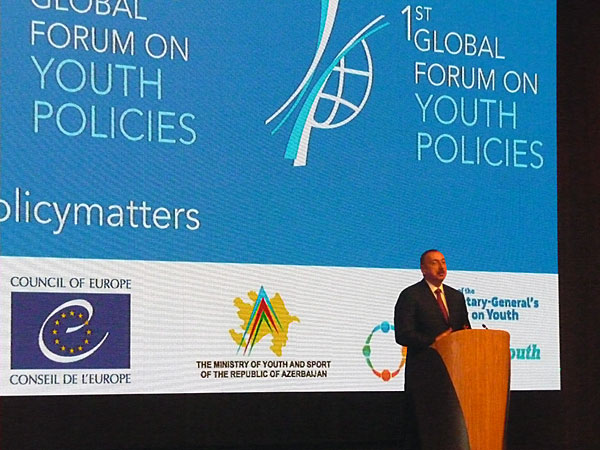
BAKU – The 1st Global Forum on Youth policies organised by the United Nations and the Council of Europe takes place from 28 to 30 October in Baku, the capital of the Republic of Azerbaijan. This activity is organised in the context of integrating the issue of youth as a priority for the international community. The UN has appointed for the first time in its history an “Envoy on Youth of the UN Secretary General”. The envoy is Ahmad Alhendawi. Two UN agencies are partners, i.e. the UNDP, the United Nations Development Programme and UNESCO, the United Nations Educational, Scientific and Cultural Organisation.
Almost 20 years after the international community adopted the “World Programme of Action for Youth” in 1995 that provided the first global blueprint and framework for youth policies, some 700 participants are discussing how to strengthen the youth policies noticing that today 122 countries have current policies, with another 36 updating their youth policy.
 President of the Republic of Azerbaijan, Ilham Aliyev
President of the Republic of Azerbaijan, Ilham Aliyev
Leading personalities are attending the Forum starting with the President of the Republic of Azerbaijan, Ilham Aliyev who dedicated a long part of his forty minute speech to the importance of sport for youth generations. The Opening Ceremony saw Ban Ki-moon, Secretary-General of the United Nations intervening in a video message. Magdy Martínez-Solimán, UN Assistant Secretary-General and Director of the Bureau for Policy and Programme Support, UNDP started the opening ceremony, followed by Lalla Aïcha Ben Barka, Assistant Director-General for Social and Human Sciences, UNESCO; Snežana Samardžić-Marković, Director-General of Democracy, Council of Europe; Bashar Hobbi, Global Youth Ambassador, A World At School; Greta Rios, Ollin, Jóvenes en Movimiento (Youth in Motion) addressed the participants focusing on the necessity to have youth policies since many countries now have the largest number of youth they ever had in the history of their country.
The thematic priorities discussed focused on the following:
|
Education Employment & Entrepreneurship Environment Gender equality Health Information & Communication Technologies Intergenerational dialogue |
Leisure Participation Peace & Security Social inclusion Urbanisation & Housing Volunteerism Youth & Justice
|
The main focus was on building, governing and implementing youth policy frameworks. In order to achieve these objectives, the participants concentrated on the following approaches:
· Legal frameworks and instruments;
· Maintaining a consistent evidence-base;
· Making youth policy transversal & cross-sectoral;
· Strategies for youth and stakeholders’ participation;
· Political commitments and mobilisation of resources;
. Guiding principals for youth policies;
· Building monitoring and evaluation systems.
The challenges pointed out by the participants are: managing the complexity, tracking, monitoring and evaluating constantly the youth policies, the necessity to connect youth policies with other frameworks and the impact on employment and importance of volunteering to get more from those policies. The key words for many experts are “access” and “financial resources”.
It was underlined that young people must be considered as partners, agents of change, and beneficiaries of the youth programmes. What they need are investments rather than support and to be included in decision processes especially to adapt the youth policies.
 Kolë Gjeloshaj with Ahmad Alhendawi
Kolë Gjeloshaj with Ahmad Alhendawi
FISU was represented by Kolë Gjeloshaj, Director for Educational Services who noticed that the FISU motto “Tomorrow’s Leaders” was included in many speeches. It was important for FISU which has now a Students Committee, to participate in this Forum not only because the youth are the participants of the FISU events but also as sport is fully part of the tools and activities used in many United Nations programmes and is part of the national youth policies of a large number of countries. Finally, FISU is always bearing in mind that in many countries, sport and youth are in the portfolio of the same Minister.
(Source: Dept. of Education)

